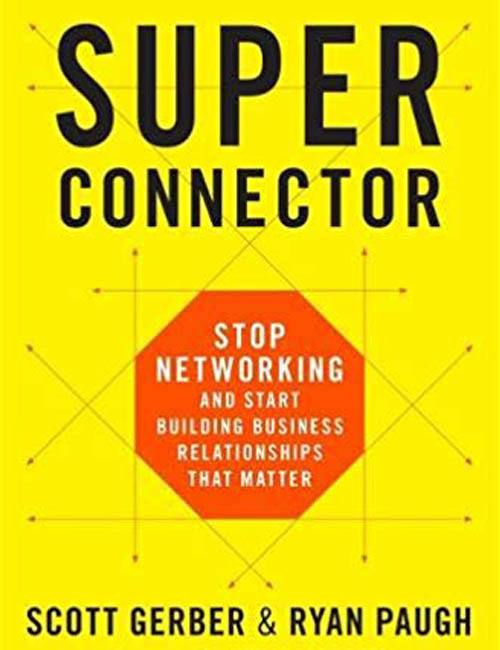Reviewed by Randi Stillman, restillman@bottomlinemr.com
Bottom Line Market Research & Consulting, Atlanta, GA
Scott Gerber and Ryan Paugh believe that what matters most in life and business is not following the standard measure of transactional and self-interested networking but instead focusing on how many people you help, or serve, within your sphere of influence. In their new book, Superconnector: Stop Networking and Start Building Business Relationships that Matter, they help us understand the power and beneficial outcomes of building these relationships.
Gerber and Paugh definitely practice what they preach. They are co-founders of The Community Company, which builds and manages personalized, invitation-only communities to help professionals grow their networks and expand their business opportunities. They are also co-founders of Young Entrepreneur Council (YEC), whose membership numbers 1,700 under-40-year-old North American entrepreneurs whose companies make more than $1 million in annual revenue.
The co-authors define “superconnectors” as “highly valuable community builders who make things happen through their keen understanding and utilization of social capital…the most important currency in the world.” For them, to think like a superconnector is to focus on how you can be of service to the person in front of you, whether actually or virtually, and to genuinely care about their needs. A superconnector introduces people to each other who might benefit from knowing one another because they share a common goal or passion. The point is to define which relationships matter most for you and to cultivate them without expecting immediate ROI. Consequently, Gerber and Paugh devote an entire chapter up front to the core skill of “habitual generosity,” i.e., acting on the knowledge that your greatest returns and opportunities come when you least expect them.
Of course, there is no one-size-fits-all blueprint for building community. Gerber and Paugh lay out their systematic and authentic methods and provide useful tips. They begin with self-assessment questions to guide you to view relationships through a long-term personal lens by which relationships matter most, what paths to connection are right, and how you will sustain your community over time. An honest self-assessment ultimately attracts kindred spirits, who often become trusted connections.
Gerber and Paugh guide the reader through the mindset, strategies, and tactics of becoming a superconnector. Chapter titles reflect core lessons, e.g., “The Art of Selectivity,” “The Power of Association,” “Good Questions, Bad Questions, and Everything in Between,” and “How to Make a Smart Ask as a Superconnector.” The co-authors share many relatable and instructive anecdotes from their own experiences and the individual journeys of 41 high achievers listed at the end of the book.
Overall, Gerber and Paugh challenge us to rethink the way we interact with everyone on our individual journeys to achieve our business goals in the social networking age. Our communities provide a foundation for sharing knowledge and insight with others who deeply care about the same issues and topics as we do. Meaningful interactions, such as giving and getting feedback, support, introductions, referrals, and access to opportunities are by-products of intentionally cultivated relationships. The only caveat, which Gerber and Paugh explain and offer as a warning, is that if wealth is your main goal in joining or creating a community, your efforts will backfire.
Qualitative researchers will be delighted to learn that many qualitative skills and methods, notably asking the right questions, listening actively, and dot-connecting, play an important role in the context of developing a unique collection of mutually beneficial business relationships. It does not matter if you are starting out, established or in transition in your industry or job, this book provides useful insights.
Superconnector inspired me to re-examine my approach to building purposeful and sustainable business relationships. I welcome Gerber and Paugh’s timely lessons given the challenges of evolving professionally in a noisy world of constant change. While I do my best to leverage technology to make meaningful connections, I am reminded by the wise, practical, engaging content in this book that what matters most in life and business is the human connection from helping each other. Above all, Superconnector has inspired me to re-examine how I provide value to others in my existing communities and to cultivate new business relationships, perhaps a new community, based on long-term mutual benefit.


Be the first to comment